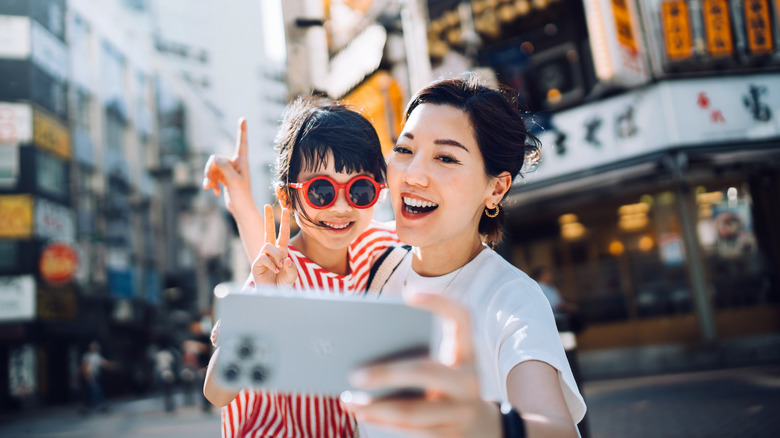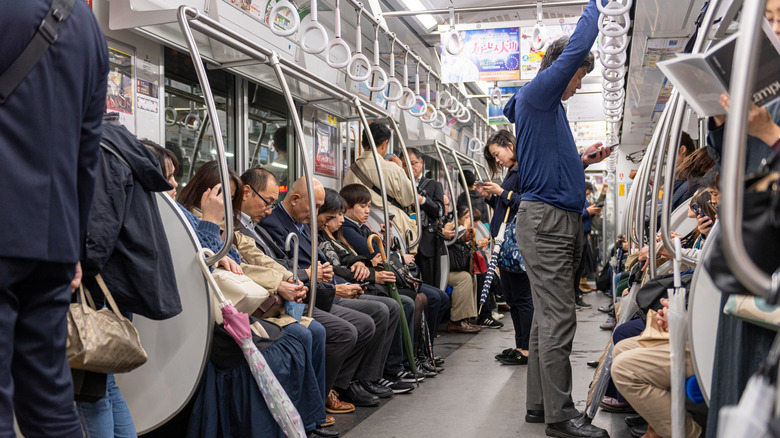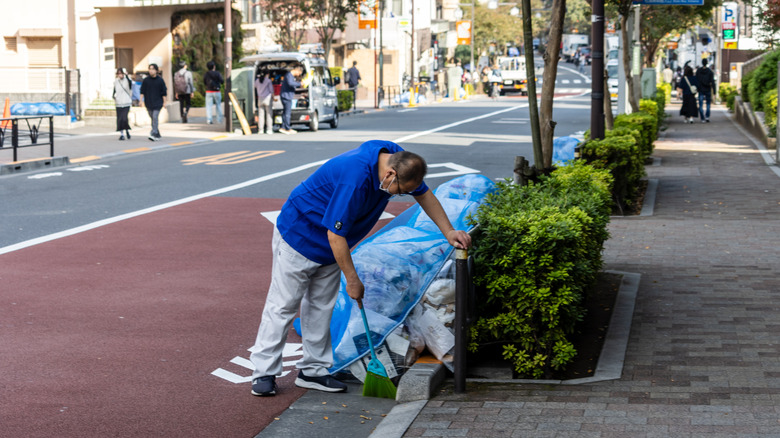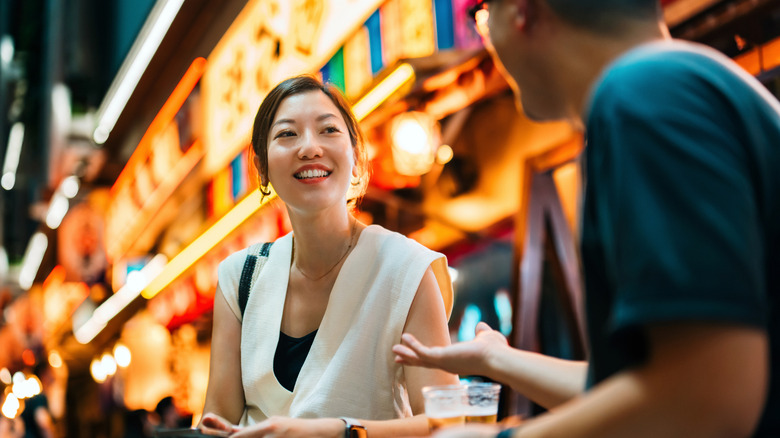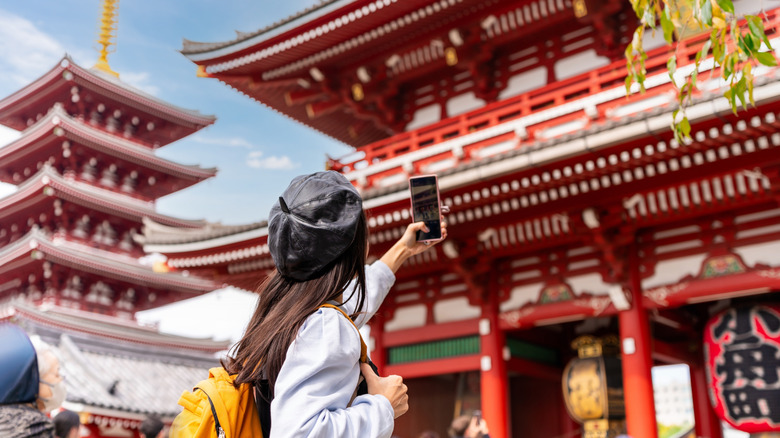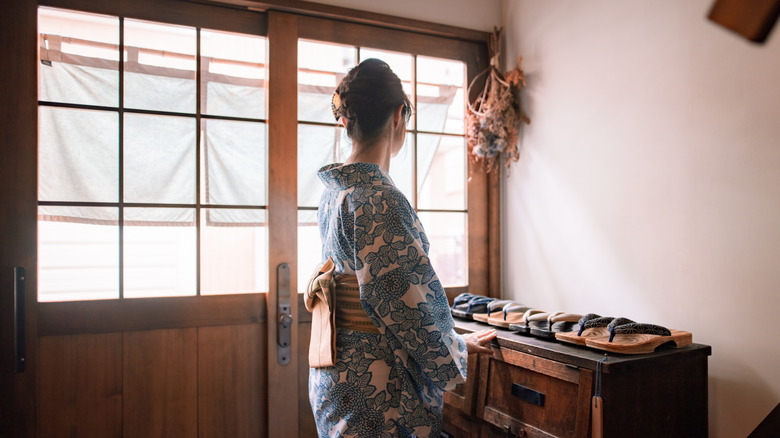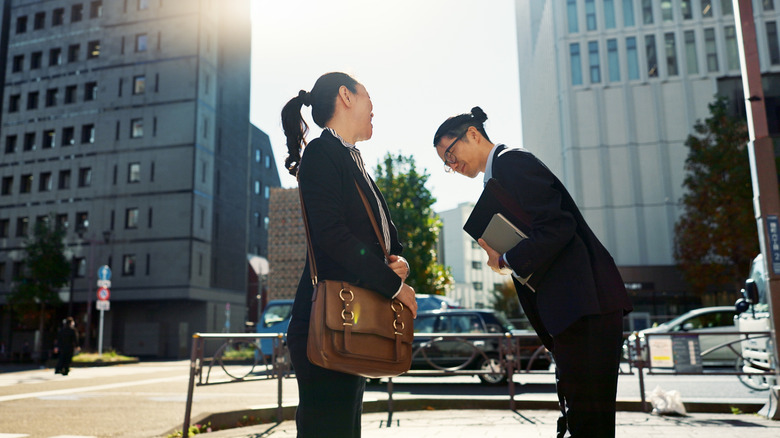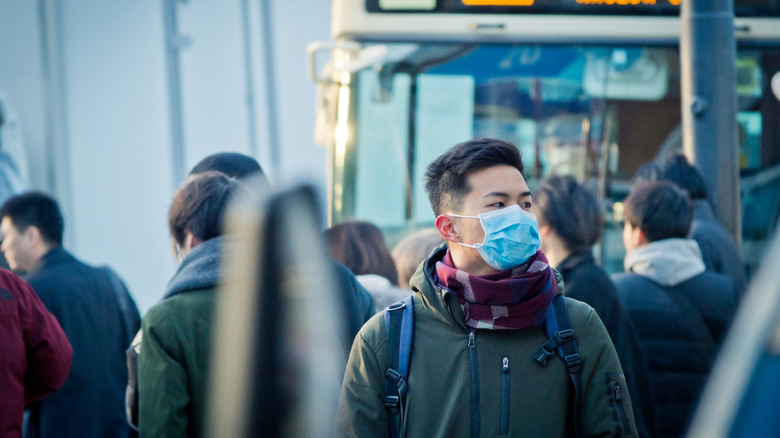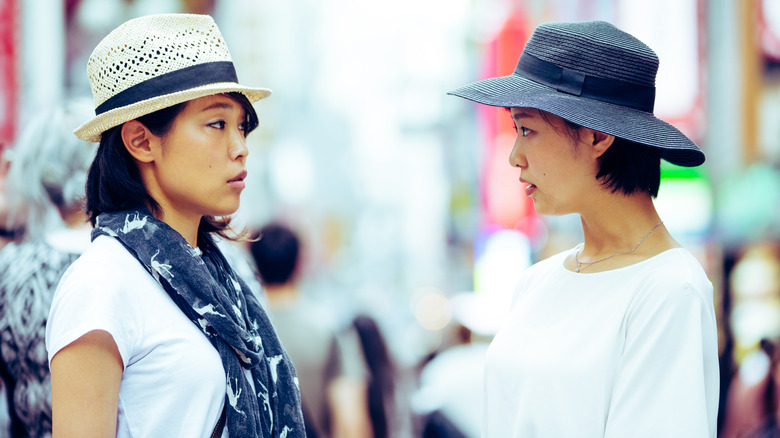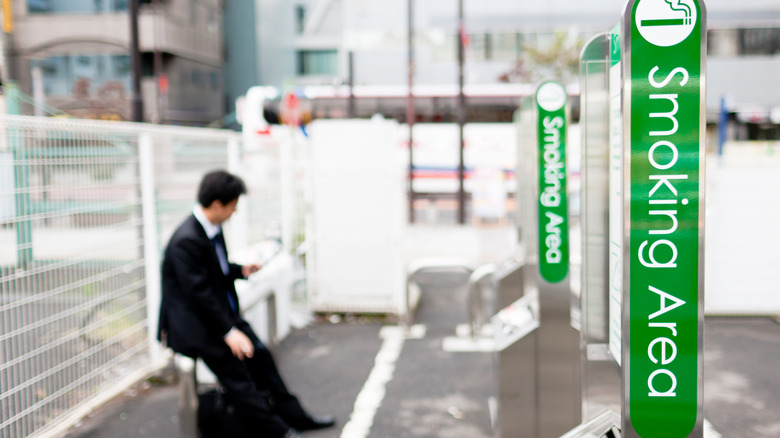The Most Common Tourist Behaviors That Rub Tokyo Locals The Wrong Way
Whether you're an anime lover looking to stroll through the neon streets of Shibuya or a history buff dying for an ancient temple experience, Tokyo is a dream destination for many. However, unlike domestic destinations, where visitors generally have a basic understanding of the culture and traditions of the place they're traveling to, this Japanese capital has proven to be a challenging environment for many international tourists.
Tokyo, for all its big-city shine, is a city that runs on an unspoken code of conduct — one that many wide-eyed visitors accidentally fumble. That's right, we're talking about the subtle (and not-so-subtle) missteps tourists make that send locals sighing into their konbini coffee and rolling their eyes. Although the locals of Tokyo are known for their hospitality and politeness, it doesn't mean that you won't sour your stay by taking loud phone calls in the middle of the train or treating a sacred shrine like your personal Instagram backdrop.
We dove into the depths of online forums and confessions written by actual Tokyo locals to understand what exactly about tourists makes them tick, and have collected their biggest pet peeves here for you. So don't be that foreigner who missed the memo; from chopstick etiquette to photography no-nos, get ready to take some notes on what you need to do to explore Tokyo confidently, respectfully, and without accidentally offending someone's grandmother at the onsen.
Speaking loudly on public transportation
Lucky for tourists, the best destinations across Japan are accessible by train, be it the Tokyo metro or the famous "bullet train," aka the Shinkansen, that connects major cities. However, unlike the trains you might be familiar with in Western cities like New York or London, riding the rails in Japan demands that you learn a few etiquette rules. The most important of these is to keep the volume low.
While no one will deny you a ticket on the train for having a voice that carries or coughing too loudly, visitors need to realize that Japanese culture puts great importance on respecting others, and this means keeping the peace in shared spaces like train carriages. There's no expectation that passengers will be completely silent for the entirety of their journey, but jamming to your commuting playlist without headphones is sure to get you some dirty looks. One local Reddit user described the situation this way: "Short, casual conversations in a low-ish, non-intrusive volume are generally fine. Loud conversations are frowned upon, as are phone calls."
Another Reddit user added, "It's not OK to talk with people you don't know." Avoiding this kind of loud and intrusive behavior is especially important in a city as big as Tokyo. According to the World Population Review, there are roughly 37 million people who reside in Tokyo, meaning busy, often cramped, trains. And more riders mean more locals you could potentially offend.
Littering
What will you see a lot of in Tokyo? Karaoke bars, udon joints, and gachapon arcades. Something that's a lot more scarce? Trash cans. That's right — if you've ever strolled through Tokyo with an empty coffee cup in hand, you'll know all too well that public trash cans are almost nonexistent in the city. There are many reasons for this. Many point to the importance Japanese culture places on personal responsibility, while others cite the sarin gas attack that occurred on the Tokyo metro in 1995. The perpetrators used public trash cans as hiding places for the gas, leading to city officials removing many of them.
No matter the reasoning, though, it's an important tip for tourists to remember that it is highly looked down upon to litter in Tokyo. Follow in the footsteps of the locals: make sure you bring a bag to house any rubbish you might collect throughout the day — coffee cups, plastic wrappers, used tissue — and dispose of it properly when you return to your hotel.
Tokyo has a reputation for being an incredibly clean city, so when a tourist drops a wrapper on the sidewalk or leaves a dirty cup on a bench, it sticks out, and not in a good way. One Reddit thread was littered (no pun intended) with comments from locals warning future visitors about their trash. One user wrote, "'Take your garbage with you' should be at the top of the list for every visitor."
Assuming that everyone you meet speaks English
Tokyo might have a reputation for being an incredibly technologically advanced city, but that doesn't mean that everyone you come across in the city is a polyglot. Even though your Airbnb host, the workers at the airport, or the front desk staff at your hotel may be able to converse with you in English, it's important to remember that the same won't be true once you're released into the city's concrete jungle.
In fact, when visitors launch into rapid-fire English without so much as a "Konnichiwa" (Japanese for "hello"), it can come off as incredibly rude. Many Tokyoites study English in school, but using it in everyday conversation isn't the norm, and tourists should know that not everyone you encounter on the city streets will feel confident speaking it aloud. No one expects non-Japanese tourists to master the language before arriving, but showing that you have put in the effort to learn a few phrases will go a long way in avoiding awkward encounters.
One Reddit thread saw Japanese locals vent about their frustrations with tourists who just assume that every local they encounter will be able to have a conversation in English. One user writes, "Expecting that everyone can speak English is a big one for me. Saw way too many families that acted entitled after no one did understand/wanted to understand them, disgusting behaviour." Another netizen writes, "...The language spoken there should be respected."
Taking sneaky or unauthorized photos
One of the biggest rules in this laid-back but culture-rich Japanese city is that you do not treat temples and shrines with disrespect. While many tourists flock to Tokyo for the once-in-a-lifetime chance to witness the majesty and the grand history of these highly-adorned and special works of architecture, others see them as nothing more than interesting set dressing in an otherwise modern city. It's this attitude that can cause tourists to break one of the most important etiquette rules in Tokyo.
In many shrine and temple locations, photos will be strictly off-limits, or at the very least, there will be signs asking visitors to limit their photo-taking to certain areas of the site. One Japanese local confirmed this on Reddit, warning potential Tokyo tourists that "taking pictures outside temples and shrines is fine, but anything under their roofs (i.e. the interiors) is considered sacred and you're not supposed to take photos of them, even if the doors are open."
Photography can also become an issue when tourists try to take sneaky photos of locals they find interesting. It's not a crime to be mesmerized by the colorful cultural dress of a Geisha or marvel at a passerby in a kimono, but it is considered highly rude to photograph these people as if they were animals in a zoo. Another Reddit user warns, "Certainly DO NOT photograph a Geisha, ever." Another user noted that no matter how cute they might look, "DO NOT PHOTOGRAPH CHILDREN."
Running late
Is your Apple Watch charged? Are the batteries in your wristwatch fresh and new? You might want to check on your time-keeping devices before hopping on that plane to Tokyo, as the locals of this city see punctuality as practically a civic duty. In most international cities, being on time is considered the polite thing to do, but in Tokyo, running late carries an extra strong stigma. You can see this virtue at work in the train system.
The Tokyo metro runs like clockwork (down to the second) and is internationally recognized for being one of the most efficient transportation systems in the world. That's why when tourists show up 10, 15, or — if you can imagine it — 30 minutes late, many locals are unable to roll their eyes and get on with business as usual. For many, it is considered a personal slight and will be seen as a sign of disrespect for your host, your hairdresser, your tour guide, or whoever you have made wait on you.
Being on time represents reliability, consideration, and professionalism — even in social situations that tourists from other cultures might think of as being casual. So here's a pro-tip for visiting this beautiful city: late arrivals throw off the groove, especially in this city where everything operates like a finely tuned machine. One Reddit user explains this cultural practice by writing, "We're just used to seeing people showing up on time and when they don't we feel inconvenienced."
Wearing your shoes when entering a home
One etiquette rule you should never break when visiting Tokyo is forgetting to take off your shoes when visiting someone's home. For many tourists who are in for a fast and furious trip to the skyscraper-dotted city, domestic visits aren't necessarily top on the priority list. However, for tourists who are diving into the deep end of Japanese culture and might be entering the homes of locals, it's probably smart to read up on what is expected of you.
In plenty of western homes, your hosts might ask you to slip off your sandals or sneakers at the entrance of their home. However, in Tokyo — or anywhere in Japan, really — it is an unspoken must-do. There is no quicker way to earn a gasp than to stroll into someone's home with your steppers still on like you're waltzing into a backyard barbecue. However, it's not just about cleanliness. No, this is a deeply rooted cultural practice that signifies respect for your host's personal space.
It's not a generational issue, either. According to one Reddit user, "99.999% of Japanese people young and old would still firmly insist on you taking off your shoes before entering their home." Another corroborates this impression, writing, "It is just what is done in Japan. No young, middle, or old Japanese person wears outdoor shoes inside their home." However, if you're a bit foot-shy, don't worry, as most homes have house slippers at the doorway.
Going straight in for a hug
Traveling throughout Japan is easier if one understands the nation's unspoken rules of etiquette, and one of them, especially observed in the dense city of Tokyo, is that physical contact in public is a big no-no. In other parts of the world, it's common to greet everyone from close friends or friendly Airbnb hosts with warm bear hugs. To many, this shows appreciation for one giving you their time and energy.
However, in Tokyo, going straight in for a hug can feel overly familiar and out of step with the vibe of the culture. For this reason, if you're traveling to Tokyo shortly, it's important to remember to check your penchant for hugging, handshaking, and shoulder-clapping at the door. This goes for interactions with Tokyo locals as well as interactions with your travel buddies, especially if you're traveling with a romantic partner.
Many Tokyo locals cite public displays of affection as one of the biggest social crimes committed by tourists. One Reddit user warns, "Understand that physical affection is usually reserved for family and lovers and often times in private. PDA is considered rude and it's also a matter of personal space." Another Reddit user advises visitors that "Public displays of affection are strongly discouraged." Still wondering how to show kindness to strangers in Tokyo? A simple bow will do. One netizen living in Japan writes that a "sort of a half-nod/bow (mostly just the head/shoulders) which basically means "thanks/excuse me."
Flouting dining etiquette
Tokyo's culinary scene is legendary. From steaming bowls of ramen to artfully arranged sushi to those viral convenience store snacks, there's a feast for everyone. But with great meals come great responsibilities, especially when it comes to etiquette. Flouting dining customs in Japan doesn't just make you stick out — rather, it can unintentionally come off as disrespectful in a culture that takes its food super seriously.
For example, there are many important rules surrounding chopsticks. Waving them around while eating, pointing with them, or sticking them upright in a bowl of rice are all seen as taboo. The latter is especially looked down upon, as it mimics a funeral ritual. Also on the list: spearing food with your chopsticks and passing items from chopstick to chopstick. This is another funeral ritual that is considered sacred and special to a mournful occasion. When asked for tips on how to follow dining etiquette while in Japan, one Redditor cites these rules and writes, "Don't be a gorilla on the table."
It's not all doom and gloom, though. Slurping noodles, on the other hand, is surprisingly encouraged! This noisy way of eating is seen as a sign of appreciation for all the artistry and hard work that went into making and serving up your meal. So treat those chopsticks with respect and remember to get a bit messy with your ramen and udon, and your culinary trip around Tokyo is sure to be the stuff of dreams.
Wearing strong perfume
If you're traveling to a glitzy European location like Milan or Paris, stopping off at a posh perfumery to buy a new scent is, for many savvy travelers, a must-do. However, in Tokyo, the culture surrounding perfume couldn't be more different. Spritzing yourself before entering the great, wide world in Japan is often looked down upon. It's believed that many perfume scents can come off as overpowering and colonize the public space. That's because in Japanese culture, personal space is taken very seriously, and any overstepping of spatial boundaries is seen as rude.
Many locals prefer subtlety when it comes to fragrance, and overly strong smells (even good-smelling ones) can be seen as impolite, especially in confined spaces like trains, elevators, or restaurants. To put it simply: you might think you're giving Chanel No. 5, but your fellow commuters may be silently begging for fresh air. When someone asked about perfume use in a subreddit titled "Japan Travel Tips," one local writes, "Nobody uses cologne in Japan, because locals consider it intrusive. Just don't use any."
Not wearing a face mask when you are sick
One thing you should expect when visiting Tokyo? You're going ot see a lot more face masks than you might be used to seeing in your hometown. In Tokyo, courtesy isn't just about saying "please" and "thank you" — it's also about keeping your germs to yourself. In Japan, wearing a face mask when you're sick isn't optional; it's an expected social norm.
Whether you've got a sniffle, a cough, or a full-blown cold, slipping on a mask is seen as basic public etiquette. It's not just about public health paranoia, though. It's a cultural practice rooted in mindfulness. On public transportation, in crowded eateries, and even just walking down a busy street, wearing a mask can signal to others that you're looking out for your fellow man. One netizen echoes this on Reddit, writing, "If you sound sick or feel sick, think of everyone else and wear a mask."
Openly staring at locals
The capital of this amazing Asian island nation might just be the ultimate destination for solo travelers. But if you're looking to make friends while traveling solo in Tokyo, then you might want to brush up on what's expected of you when approaching locals and striking up conversation while in the great, neon city. One important rule in interacting with others, not just in Tokyo, but in all of Japan, is that openly staring at others is a major faux pas.
In other international cities like New York or L.A., a long, appreciative gaze at someone's killer outfit or amazing hairstyle could come across as a compliment. In the Land of the Rising Sun, the opposite is true; intense or prolonged eye contact can come across as invasive or rude. So remember, while curiosity is natural, it's best expressed with subtlety and respect. One poster on Reddit clarifies that, while eye contact with your friends and loved ones is expected, "It's considered direct and somewhat aggressive when it's a stranger."
Smoking outside of designated areas
If you're lighting up in Tokyo, you'd better know where to puff and where to pause. Unlike many cities where smokers might casually light a cigarette as they stroll down the sidewalk, Tokyo has strict rules about where you're allowed to smoke in public. These are not unspoken etiquette rules that exist on a "if you know, you know" basis. Nope — it's right there on the signs dotted across the city that read, "Smoking Area."
Ignoring these restrictions is not only a quick way to irritate locals, but could also potentially result in a fine. Tokyo is a busy city and its dense streets and high foot traffic mean that a stray puff of smoke or a dropped cigarette butt isn't just annoying, it's invasive. To combat this, many neighborhoods created marked-out smoking zones, often complete with ashtrays and clear signage. Remember that these areas are your only approved spots to smoke, and yes, that means no lighting up while walking or hanging around in parks, train stations, or outside bars.
These rules aren't just for show. No, Tokyo prides itself on its cleanliness and order, and rogue smokers stand out fast — not in a cool, rebellious way, but in a "Why are you doing that?" kind of way. When one Reddit user asked Japanese locals about the smoking restrictions, they were quick to respond. One netizen warns, "If it says don't smoke, don't smoke. Especially in an airbnb. But everywhere in Japan."
